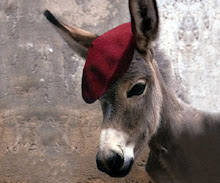Faithful reader SJG recently forwarded one of those emails that amuse with simple truths:
11 Things You Won't Learn In School
It is amusing, you bet. Kinda like something from the Readers Digest of my youth. And I mean that in a good way. The 11 untaught things were supposedly pointed out by Bill Gates, spoken when addressing some high school students. I like it -- though I'm not hard to please. I won't include it here, 'cos you probably already got it from someone else.
The originator of the forwarded email, a Ph.D. student at American University, closed her email with a quote from Edward Said. Yeah, that Said. Here's the quote:
"I have never known what language I spoke first, Arabic or English, or which one was really mine beyond doubt. What I do know, however, is that the two have always been together in my life, one resonating in the other, sometimes ironically, sometimes nostalgically, most often each correcting, and commenting, on the other."My favorite pic of Professor Said is the one where he's chucking rocks at Israeli soldiers. Yeah, he was an adult at the time of the stoning. Pot-bellied, graying hair, baseball capped and throwing like a tenured, Ivy League professor. That's as deep into the learned educator as I ever needed to go.
I'm thinking Andrew Klavan covered Said pretty well in his 2008 novel Empire of Lies, where the character Arthur Rashid has gotta be Said:
"A hugely popular professor of multicultural studies, he was credidted with formulating the very concept of multiculturalism in his bestselling book, Eastern Mind, Western Eyes. ... It is the nature of culture that it directs our words and actions even when we are not aware of its influence...." (P. 145)Yeah that sounds like Said to me. Blah blah blah, multiblahcultureblahblah. All thoughts thought are dictated by the culture in which I grew up, white-ish, raaaaacist, imperialist, crusadery, blah de blah.
Me? I never knew which lingo came first either; the stoner or the stonee. Some days I'm the thrower of the stone, some days I'm the throwee. Other days I'm the stone itself. Them's the three yappers in my infernal stonebonics conversation
Took a look in my library and I do not have Said's work,
I did spot 8 books by Bernard Lewis and 5 by Ibn Warraq (including his Defending the West: A Critique of Edward Said's Orientalism). I mention those titles, marked and parked on my shelves, only because those writers show up as Orientalists below.
Meahwhile, for/from the archives, here's some previous commentary regarding Edward said:
May 7, 2008*****
Edward Said's Shadowy Legacy
Tricky with argument, weak in languages, careless of facts: but, thirty years on, Said still dominates debate
Said had a problem with languages. For example, when discussing the writings of Sir William Jones and Friedrich Schlegel, he was mysteriously determined to deny that Sanskrit, Persian, German and Greek all belonged to the same broad group of languages – a sort of club to which Arabic could not belong. Ibn Warraq, in discussing Said’s attitude to Orientalists, remarks that he was “particularly jealous of their mastery of languages”. German scholars dominated Arabic, Hebrew and Sanskrit studies in the nineteenth and early twentieth centuries, yet Said avoided any substantial discussion of their work. Some critics have argued that this was because the pre-eminence of German Orientalists did not fit his thesis about the interdependence of Orientalism and imperialism in the Middle East, but others have suggested that it was because his German was not very good. Varisco has noted how Said mistranslates Goethe’s famous line “Gottes ist der Orient!” as “God is the Orient”. He has also spotted that Nerval’s “La mer d’Ionie” was mistranslated as “the Ionian sky”. Ibn Warraq is unhappy with Said’s English, specifically with his misuse of the adverb “literally” and his confusion of scatology with eschatology. Other critics have wondered about Said’s Arabic.
Orientalists Fight Back'Nuff said on Said for today, yes?
For a number of years now, Islamologists have been aware of the disastrous effect of Said’s Orientalism on their discipline. Professor Berg has complained that the latter’s influence has resulted in "a fear of asking and answering potentially embarrassing questions - ones which might upset Muslim sensibilities....".
For Clive Dewey, Said’s book "was, technically, so bad; in every respect, in its use of sources, in its deductions, it lacked rigour and balance. The outcome was a caricature of Western knowledge of the Orient, driven by an overtly political agenda. Yet it clearly touched a deep vein of vulgar prejudice running through American academe".
The most famous modern scholar who not only replied to but who wiped the floor with Said was, of course, Bernard Lewis. Lewis points to many serious errors of history, interpretation, analysis and omission. Lewis has never been answered let alone refuted.
And, since you asked, Bill Gates' Rule Numero Uno:
Life is not fair - get used to it.
_______________________________________________________
Coda:
Gottes ist der Orient!
Gottes ist der Okzident!
Nord und südliches Gelände
Ruht im Frieden seiner Hände.
Er, der einzige Gerechte,
Will für jedermann das Rechte.
Sei von seinen hundert Namen
Dieser hochgelobet! Amen.
Mich verwirren will das Irren;
Doch du weißt mich zu entwirren,
Wenn ich wandle, wenn ich dichte,
Gib du meinem Weg die Richte!













No comments:
Post a Comment